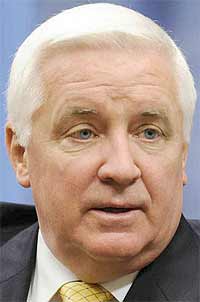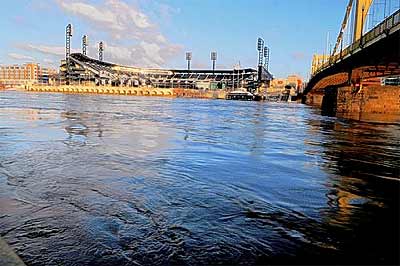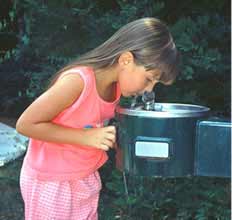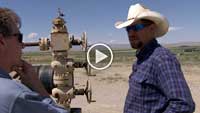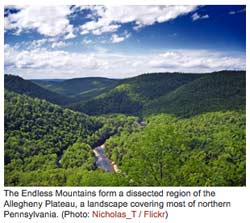Biblio
Learn how new drilling technology and rising fuel prices are driving the natural gas rush in Pennsylvania's Marcellus Shale—a 6,000 foot deep rock formation which has the potential to fuel the entire country for two full years.
This live, one-hour, call-in program on Thursday, May 22, 2008, offered viewers objective and reliable advice about:
- Natural gas exploration and drilling on leased land
- Lease negotiations and addenda
- Financial, environmental, and infrastructure impacts
WPSU: Gasrush
Landowner information on gas leasing in the Southern Tier. See: Tioga County Landowners Group.
"We need to protect the water," Gov. Corbett said.
Pennsylvania regulators on Tuesday called on Marcellus Shale natural gas drillers to stop sending wastewater to 15 treatment plants, citing an increased risk of contaminating public drinking water.
The Department of Environmental Protection's action, while voluntary, will likely set the stage for a formal ban on the discharge of inadequately treated wastewater into the state's rivers...
DEP's announcement came the day after Corbett, who has been criticized for his close ties to drillers and his refusal to support a gas-production tax, assured local officials he would not allow the industry to "poison the water."
"We need to protect the water," the governor, a Republican, said at a meeting of the Pennsylvania State Association of Township Supervisors. "But we must do it based on science, not emotion."
...The DEP and the industry appear to have been influenced by complaints from public water suppliers in Western Pennsylvania, which say they are challenged by bromide levels whose concentrations have increased concurrently with the drilling boom.
The bromides themselves are not a public health risk - they account for a tiny part of the salty dissolved solids that create an unpleasant taste in water at elevated levels.
But bromides react with the chlorine disinfectants used by drinking water to form brominated trihalomethanes (THMs), a volatile organic compound.
See: Carbon County Groundwater Guardians | Pennsylvania
Studies have linked the prolonged ingestion of high levels of THMs to several types of cancer and birth defects.
Officials at several water authorities in the Pittsburgh area say their facilities have failed several tests for trihalomethanes in recent years.
See: Despite overhaul, gas wastewater still a problem
Some say the controversial method of extracting natural gas known hydraulic fracturing, or fracking, is polluting their water. Regulators said they had no jurisdiction on the Fento Land.
Watch the individual segments:
PBS Editor’s note: This video was temporarily taken off the site to reconfirm past and current energy industry affiliations of members of an EPA peer review panel. We determined that our original reporting and statements were accurate, but to avoid confusion about the members’ current affiliations, a graphic listing their names was removed with accompanying narration.
Change.org, the website that allows users to create petitions for social change, received a legal threat from Peabody Energy after Coal Kills Kids (CKK) -- a group that partnered with the Yes Men to unveil a faux Peabody charity initiative earlier this week -- continued the hoax with a mock petition.
The petition was titled, "Stop Peabody Coal's Outrageous Coal Cares campaign," in mock outrage over the Coal Cares website that CKK developed in tandem with the Yes Men. The website claimed that Peabody had created a charity to "make asthma cool" by giving away free designer inhalers with themes like My Little Pony and The Bieber.
Peabody's lawyers contacted Change.org on May 12 and threatened to file suit if the fake petition against the fake website wasn't removed within 24 hours. "The lawyers seem as serious as an asthma attack," said Ben Rattray, founder of Change.org. The website agreed to remove the petition in order to avoid legal entanglement.
"I think Peabody probably made a mistake doing this," noted Change.org spokseperson Brain Purchia. "Because now it's drawing more attention to the problems that coal-burning power plants are causing."
The Yes Men and Coal Kills Kids received their own legal threat from Peabody, and they issued a response early this morning.
Here's what they wrote:
Dear Andrew Baum, Foley Lardner LLP, and Peabody Energy,
Thank you for your thoughtful letter demanding that we remove Peabody’s name from www.coalcares.org and cease falsely suggesting that Peabody cares about kids made sick by coal.
Your threat, although entirely baseless (see ... the EFF's blog post), did make us realize one thing: that Peabody, despite being our country's largest coal producer, and one of the largest lobbyists against common-sense policy, accounts for a mere 17 percent of U.S. coal production. The remaining 83 percent comes from 28 other companies, who are, every bit as much as Peabody, giving kids asthma attacks and other illnesses.
As even you may agree, the root of the problem is not Peabody, but rather our system of subsidies, regulations, and lobbying that lets your whole industry continue its lethal work. To make this clear, we have changed every instance of the word “Peabody” on www.coalcares.org to a rotating selection of the names of other large U.S. coal producers who, like Peabody, also need to be stopped from killing kids.
Very truly yours,
Coal is Killing Kids and the Yes Lab
See: Coal company gets punked by the Yes Men
See: The Yes Men
"Answers to questions frequently asked by landowners about oil and gas leases and drilling." Commonwealth of Pennsylvania, Department of Environmental Protection.
For more information, visit DEP’s Web site at Keyword: “Oil and Gas.”
Trucks hauling rock cuttings from drilling for natural gas in the Marcellus Shale formation in Pennsylvania regularly cross the New York State border these days to dump in the Chemung County Landfill seven miles east of Elmira.
The Marcellus formation is characterized by unusually high readings of naturally occurring radioactive material, or NORM, so most of the cuttings are probably radioactive. The Chemung Landfill, a former gravel pit, has never been licensed to handle low-level radioactive waste.
So how can the landfill’s private operators get clearance from the county and state environmental regulators to bethcome a regional dump for radioactive drilling wastes?
The short answer: Provide the revenue-hungry county a rich payout, exploit a legal loophole, and presto, it’s a done deal.
The longer answer: Regulations haven’t kept pace with the recent widespread use of an invasive new drilling technology used to tap the Marcellus.
“There are many aspects of this new industrial activity that outpace existing regs. Radiological regulation is just one of them,” said Anthony Ingraffea, a Cornell University geology professor who has tracked the evolution of natural gas drilling for decades.
Earthjustice is representing the Sierra Club, Damascus Citizens for Sustainability and the Lycoming County-based Coalition for Responsible Growth and Resource Conservation as proposed interveners in a proceeding before the Federal [Energy] Regulatory Commission (FERC), which has been asked to expedite approval of a proposed pipeline that would cut through portions of northeastern Pennsylvania. The groups are calling on federal regulators to thoroughly review the cumulative environmental impacts of the project before any decision is made.
See press release (Dec. 20. 2010): Groups Move to Intervene in PA Pipeline Project
Pennsylvania lawsuit says drilling polluted water
A Pennsylvania landowner is suing an energy company for polluting his soil and water in an attempt to link a natural gas drilling technique with environmental contamination.
George Zimmermann, the owner of 480 acres in Washington County, southwest Pennsylvania, says Atlas Energy Inc. ruined his land with toxic chemicals used in or released there by hydraulic fracturing.
(Editing by Mark Egan and Philip Barbara)
See: Benzene Leukemia Law Blog. Burke and Eisner. PA Suit Claims Drilling Causing Water Contamination
After three chemical spills in the past nine days, and following a history of environmental problems over the last year , Pennsylvania officials have ordered Cabot Oil and Gas, one of the most active natural gas companies in the state, to stop its hydraulic fracturing operations in Susquehanna County pending an intensive review.
"The department took this action because of our concern about Cabot's current fracking process and to ensure that the environment in Susquehanna County is properly protected," DEP north central regional Director Robert Yowell said in a news release distributed this morning.

Pennsylvania Gov. Ed Rendell on Thursday proposed new rules to strengthen state regulation of natural gas drilling to protect drinking water supplies and announced the hiring of 68 new inspectors.
[Regulations] would require energy companies to restore or replace water supplies affected by drilling; require operators to notify regulators of any leakage of gas into water wells; and direct drillers to construct well casings from oilfield-grade cement designed to prevent leakage of drilling fluid into underground water supplies.
To bolster enforcement, the state's Department of Environmental Protection was hiring 68 new inspectors in addition to the 120 already on staff.
Pennsylvania officials say energy companies have applied for 5,200 permits in the Marcellus Shale this year, almost triple the number in 2009, as drillers scramble to develop the huge gas field underlying about two-thirds of Pennsylvania and parts of surrounding states.
Saying the cost of natural-gas development could outweigh the benefits, Pennsylvania's two highest-ranking environmental officials built a case Monday for imposing more taxes and regulation on Marcellus Shale exploration.
John Hanger, secretary of the Department of Environmental Protection, told a gas-policy conference here that it was time for the state legislature to impose a production tax on gas operators - who, he said, "are almost laughing at their good fortune at not having to pay a severance tax."
..."Quite frankly, the citizens of this state are being played for chumps," Quigley said.
DEP's Hanger ridiculed the state's 1984 law requiring gas operators to set aside a "pitiful" $2,500 insurance bond to pay for plugging an abandoned well. It costs the state about $10,000 to seal off an orphaned well.
06/22/2007: "The Icing on the Cake".
"In 2007, our analysis of the impact of the Barnett Shale indicated it was like ‘icing on the cake’ for the already healthy Fort Worth-area economy. This year, we found that activity in the Barnett Shale is making an even bigger difference, with expansion in benefits surpassing expectations." (Perryman, 2008, p.5.)
-Dr. M. Ray Perryman.
See: Encana Fracking Cake for Kids - A Look Underground
See: The Perryman Group. "Drilling for Dollars: An Assessment of the Ongoing and Expanding Economic Impact of Activity in the Barnett Shale on Fort Worth and the Surrounding Area." ( PDF 1.2MB, 2008)
Exploration, drilling, and production in the Barnett Shale natural gas field have transformed the Fort Worth-area economy with thousands of jobs and millions of dollars in investment.
...This huge surge in economic activity is generating sizable gains for local taxing authorities. The fiscal impact of the Barnett Shale stems from two primary sources: property taxes paid on oil and gas properties and enhanced retail sales and real estate development due to the economic impact of the Barnett Shale. Our analysis indicates that the total direct and indirect revenue to local governments in the region (excluding royalty and lease payments) was about $227.7 million as of 2006, and will likely increase in the future.
A follow-up to the prediction Perryman offered in 2007 for Ft. Worth did not look as rosy. Read this report from the Ft. Worth Business Press, September 21, 2009. Dan McGraw. "Cut Out." Ft. Worth Weekly. September 2, 2009. (Neil Zusman, 2010-08-20.)
See: ECONOMIC BENEFIT? REALLY?
As the horrific truth about the dangers of fracking continue to come to light, economist (and Catskill Citizens member!) Jannette Barth, Ph.D., continues to deconstruct the myth that drilling will be a boon to local communities and the state. Her latest report points out distortions and misstatements in the industry- funded studies that tout the economic benefits of fracking.
See: Janette Barth: Unanswered Questions About The Economic Impact of Gas Drilling In the Marcellus Shale: Don’t Jump to Conclusions
See: Christopherson to study economic impact of gas drilling in Marcellus Shale







